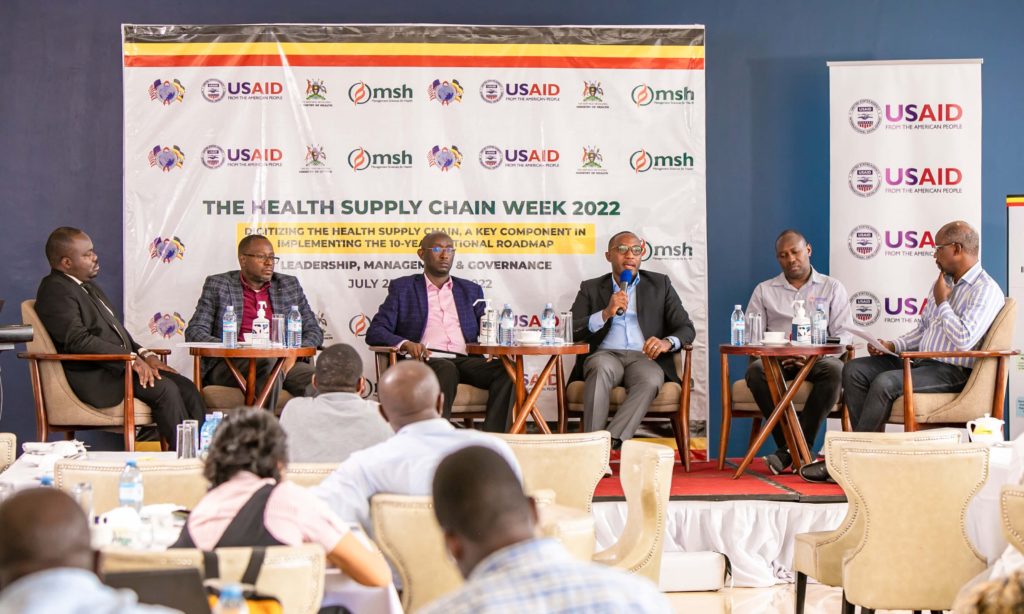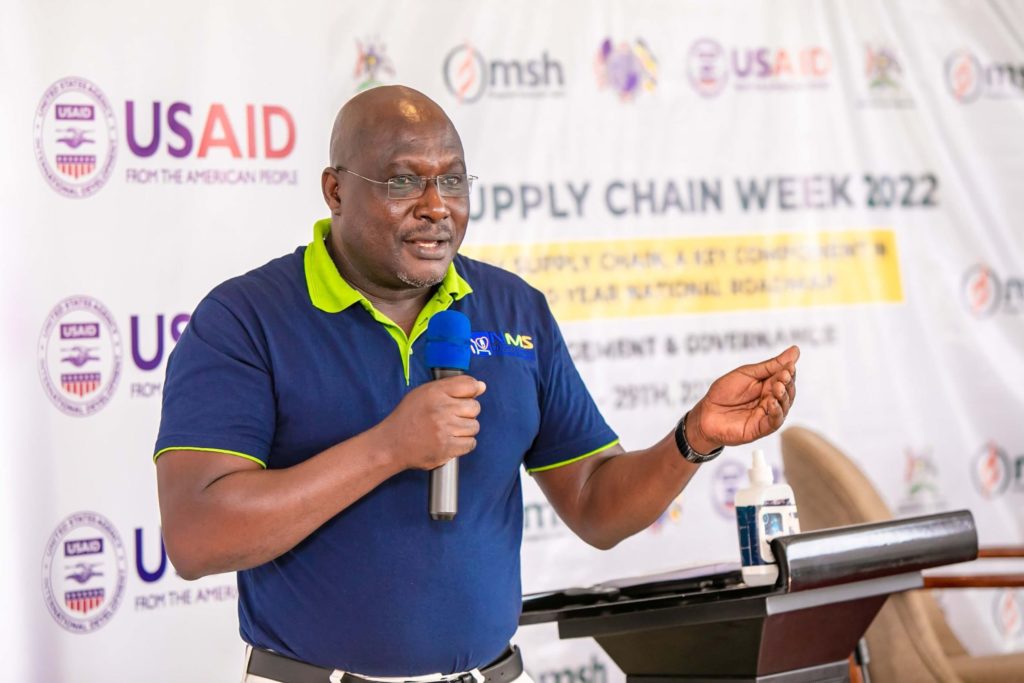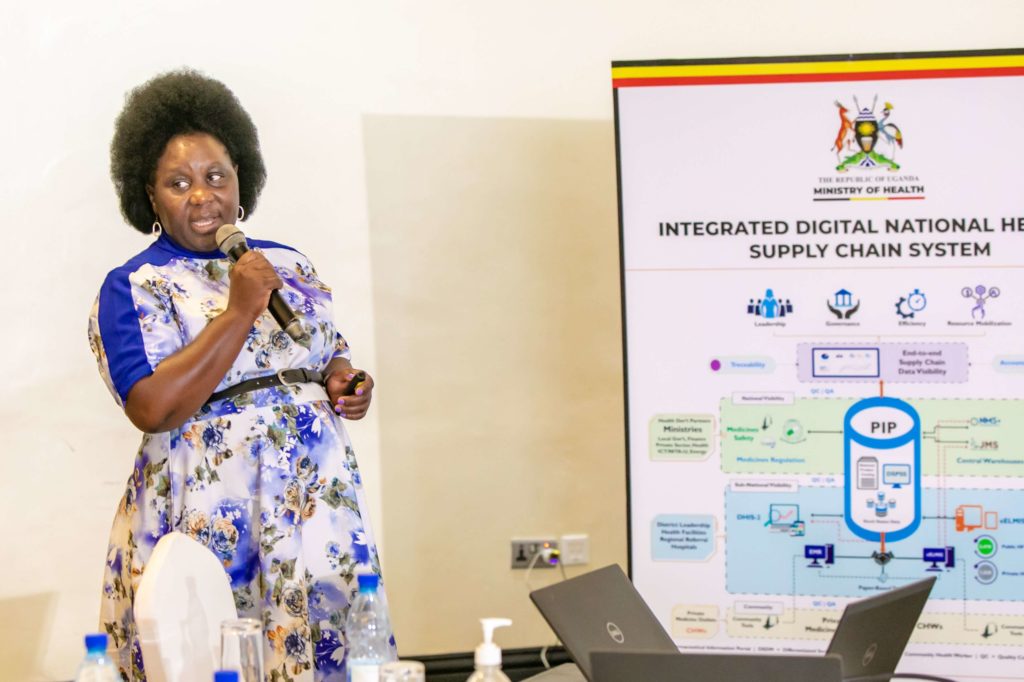Health Supply Chain Week: Celebrating Uganda’s Progress Toward Digitization
Health Supply Chain Week: Celebrating Uganda’s Progress Toward Digitization
By Jennifer Gardella
A strong health care system requires a strong supply chain; without it, medicines and medical supplies cannot reach hospitals and health care facilities and, ultimately, the patients who need them. In Uganda, inadequate access to technology and limited internet connectivity have historically contributed to an overreliance on paper-based systems, meaning that the links between central warehouses, district medical stores, and health facilities are weak. The lack of access to real-time data to locate essential medicines has led to stock-outs and expirations of vital medicines, putting the health of an estimated 46 million people throughout the country at risk.

In response to these challenges, the Government of Uganda has prioritized efforts to modernize its health supply chain–thereby improving health care service delivery, increasing health system efficiency, and saving lives–in recent years. This past January, Uganda launched its 10-Year National Health Supply Chain Roadmap to improve access to and availability of high-quality, affordable commodities–including lifesaving medicines, vaccines, personal protective equipment for frontline health workers, and other essential supplies–in all public and private health care facilities. The USAID-funded Uganda Strengthening Supply Chain Systems (SSCS) Activity, implemented by Management Sciences for Health (MSH) and local partners ACODE and Uganda Healthcare Foundation in close collaboration with several government agencies, plays a critical role in implementing this roadmap as part of a larger effort to strengthen Uganda’s health supply chain and overall health system, enabling the country to improve health services and outcomes for all Ugandan families.
From July 25-29, SSCS supported the Ministry of Health in holding its second annual Health Supply Chain Week to facilitate coordination and discussion among key stakeholders, raise awareness about and celebrate progress made to date, and find solutions to the challenges that remain. While last year’s weeklong event was held around the themes of health supply chain transparency, effectiveness, and efficiency, this year’s Health Supply Chain Week – which included a learning conference, meetings between key stakeholders, and media engagements on public television and radio channels – focused on a key component and driving force behind the 10-year roadmap: Uganda’s push to digitize its health supply chain.

Throughout the week’s events, the importance of strengthening the partnership between public health entities and the private sector through strategic, sustained collaboration was among the key themes discussed, with participants highlighting the need to overcome the tendency to work in silos. In Uganda, the importance of the public-private partnership is especially relevant in solving telecommunications challenges – namely internet and SMS coverage gaps – that hinder efficient reporting and communication across health facilities, as well as coordination with pharmaceutical and medical device manufacturers at every step along the supply chain. Dr. Timothy Musila, the Ministry of Health’s Assistant Commissioner for Private Sector Coordination, reiterated the government’s commitment to prioritize private sector engagement and foster coordination across all relevant entities, noting that the public sector “should look to continually support and engage with private sector institutions – especially those involved in manufacturing pharmaceuticals and medical devices – in our efforts to digitize the health supply chain.”
Private sector partners echoed the sentiment, emphasizing the importance of ongoing coordination across sectors to find opportunities to digitize the supply chain. “The Health Supply Chain Week has provided us with a much-needed venue for coordination and collaboration,” said Brian Mbasa, of the MTN Uganda Foundation, the philanthropic arm of the largest telecommunications company in Uganda. “More platforms like [Health Supply Chain Week] are needed so that private sector partners like MTN can help move these critical efforts to digitize our country’s health supply chain forward.”
Another important takeaway: effective leadership, management, and governance are essential for progress. Dr. Eric Lugada, SSCS Project Director, shared his thoughts on the subject when he joined a panel of experts on NBS Television’s morning talk show. “[SSCS is] not only focusing on the technical aspects of digitizing the health supply chain system, but also on strengthening governance and leadership,” said Dr. Lugada. “We must all commit ourselves to move toward a better system.”
By moving away from a manual, paper-based approach toward improved digital systems, Uganda hopes to use real-time data that will allow for better tracking and management of health commodities to increase efficiency, transparency, and accountability at every step along the health supply chain. But ultimately, these efforts are all aimed at achieving one common goal: guaranteeing the availability of lifesaving medicines and supplies at every health facility in the country so that all Ugandans can receive quality treatment and care, whenever they need it and wherever they are.

Martha Ajulong, Supply Chain Assistant Commissioner for the Ministry of Health, praised the Health Supply Chain Week initiative and the important work of the SSCS Activity during a meeting with key policy makers and other stakeholders, emphasizing the importance of digitizing the nation’s supply chain in “ensuring that medicines and other critical health commodities make it from the warehouse to the patient and improving access to quality essential medicines in Uganda.”
Dr. Lugada reiterated this point during his NBS talk show segment, providing a strong reminder of the purpose at the heart of these efforts to digitize Uganda’s health supply chain. “These commodities must be tracked and managed in such a way to ensure that essential medicines end up where they matter most – with the patient,” said Dr. Lugada. “This is a digital era, and the journey starts now.”